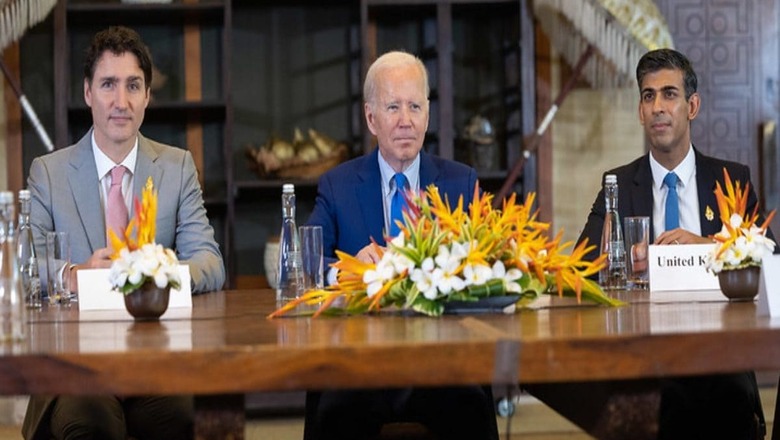
views
The more one expects the West to come to terms with the Eastward shifting of global power and reorient its policies accordingly, especially with the liberal-democratic world order coming under stress from authoritarian China, the more one is startled at the American propensity to not just refuse to make the necessary amends but also repeat the same, old mistakes way too often. The Ukraine war quite perfectly sums up the US foreign policy faux pas, wherein the Americans have managed to create an enemy out of a potential ally in Vladimir Putin against Xi Jinping’s obnoxiously hegemonistic empire.
But if one thought the US-led West had learnt from the Ukraine blunder and would put a full stop to its art of making enemies out of potential friends, here comes the Canadian gaffe. Interestingly, it has come at a time when West Asia has again flared up, putting another nail in Pax Americana, given how the Hamas attack on Israel has put the Abraham Accord on notice. Just like the Ukraine fiasco, the West Asian development has only one country coming out smiling: And that is China. (In this case, it can be one and a half countries, with the half being Iran!)
It’s startling, in this backdrop, to see the US and the UK supporting Canada in the ongoing tensions with India. The two countries, being “concerned” over the escalating tension between India and Canada, have urged New Delhi not to force the Justin Trudeau government to reduce its diplomatic presence in the country. This comes after India forced Canada to pull out 41 of its diplomats on Thursday.
Here it needs to be reiterated that the Canadian statement, saying it was recalling 41 of its 62 diplomats in India because India has threatened to strip their “diplomatic immunity”, and thus a violation of the Vienna Convention, is a clear and categorical distortion of what actually had happened. India is within its rights, and well within the parameters of the Vienna Convention, to determine the number of foreign diplomats on its soil. It’s the prerogative of the receiving State, and not the sending nation. In fact, all India is seeking is parity: Delhi has every reason to wonder why there should be 62 Canadian diplomats on its soil when Delhi has just 21 diplomats in Ottawa.
What makes the charges more serious is New Delhi’s allegation of Canadian diplomats being involved in anti-India activities. No sovereign nation with self-respect would allow that. As External Affairs Minister S Jaishankar rightly said, “…we invoked parity because we had concerns about continuous interference in our affairs by Canadian personnel. We haven’t made much of that public. My sense is over a period of time more stuff will come out and people will understand why we had the kind of discomfort with many of them which we did.”
It’s understandable that Canada is acting like a crybaby on international forums. It’s partly Justin Trudeau’s way of cutting some of the losses in domestic politics, wherein his party is on a slippery ground. Partly, it’s also the result of entrenched political culture in Canada that pampers and patronises anti-India Khalistani elements. This anti-India network is neither a recent phenomenon, nor is it a Justin Trudeau-centric development. There has been a flourishing Khalistani ecosystem in Canada since the 1980s, when incidentally Justin Trudeau’s father, Pierre, was at the helm of the country’s affairs.
It’s unfortunate how the Trudeau administration is bent on burning Canada’s bridges with India — more so for a person, Hardeep Singh Nijjar, who was a known Khalistani terrorist, had entered Canada illegally and got its citizenship in a dubious manner. There are reports suggesting Nijjar was a deep-state asset and the Canadian agencies were in touch with his family soon after his death.
However, anyone with a cursory understanding of Canadian politics would know the relationship between the two nations could exist this long primarily because Delhi had dealt with Ottawa with kid gloves. Even when it was actively promoting Khalistani terrorists wreaking havoc in Punjab in the 1980s and the early 1990s, the Indian leadership never went to the extent of putting the Canadian administration in the dock. Not even when the Canadian role in the 1985 Kanishka bombing was more than obvious. Now that India has finally decided to put in place the accountability clause, it should firmly stand by it.
To be fair, Canada is a middling power with limited global influence. What’s more disconcerting for India is the role its allies are playing: Instead of dousing the fire and making Ottawa realise that it cannot run with democratic India and hunt with Khalistani terrorists, the US and the UK have done exactly the opposite. Canada is the bait, while India remains the target. Ironically, the Western ‘masters’ don’t realise that they no longer have the bandwidth to carry out such hitjobs against India. And, it’s not in their own self-interest to indulge in such activities either.
But still, they do. Why? Because the old colonial, white supremacist habits die hard. They would chant democratic slogans when it suits their interests — remember how India was vehemently accused of backstabbing the ‘democratic West’ when it refused to join the Ukraine war in favour of the US-led alliance. They also have India’s utility, especially against growing Chinese threats. But like the white bullies of the yore, they invariably come out to the rescue of “one of their own”. This comes in the way of a ‘commonsensical’ post-Cold War, post-pandemic foreign policy, thus occasionally blinding them to the impending Chinese threats. This partly explains why they go after Russians, who are largely perceived as Asians with their Old Orthodox Church faith that challenges the Western belief system. This also in some way explains why the West, including its media and academia, is compulsively critical of India.
The Canada-like reaction is also the result of the Western tendency of being too clever than half. It’s evident in the case of Pakistan, for instance, when for all its delinquencies, for all its blunders, and for all its terror links, it is in the end rescued — sometimes just by a whisker! This is primarily because Pakistan is still being seen as an ‘asset’, though in this case, the phenomenon of diminishing returns has set in, and this explains why Islamabad is no longer entertained beyond a point. This also explains why the Khalistani terrorists are not just patronised in Canada, but also equally sheltered in the rest of the ‘Five Eyes’ nations — the United Kingdom, the US, Australia, and New Zealand.
The US-led West needs to realise that, with each goof-up, the momentum further shifts in favour of China. It’s time for a genuine, long-term democratic alliance if the hegemonistic Dragon is to be stopped, if not checkmated. And it needs a basic, fundamental tweak in the Western strategic thinking: To come out of the old colonial, white supremacist mindset and create an alliance based on democratic, liberal values. But for this, India and the West have to be friends (not necessarily allies). Canada-like nigglings have no place in such a scheme of things. The era of the Western way of having the cake (India’s support vis-à-vis China) and eating it too (constantly finding issues to corner Delhi) is over. The sooner it realises it, the better it would be for the democratic world order it seeks to retain, especially vis-à-vis China.
Views expressed in the above piece are personal and solely that of the author. They do not necessarily reflect News18’s views.













Comments
0 comment